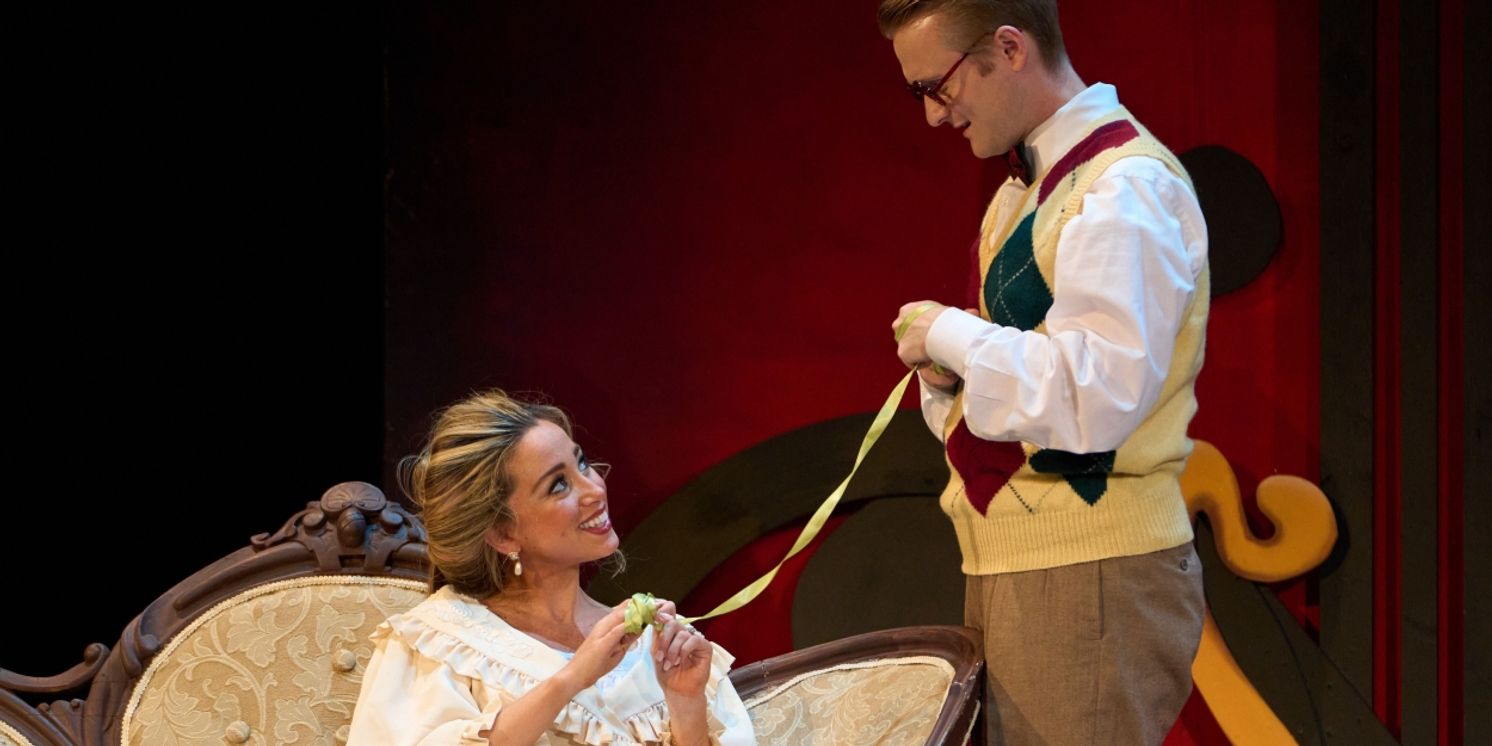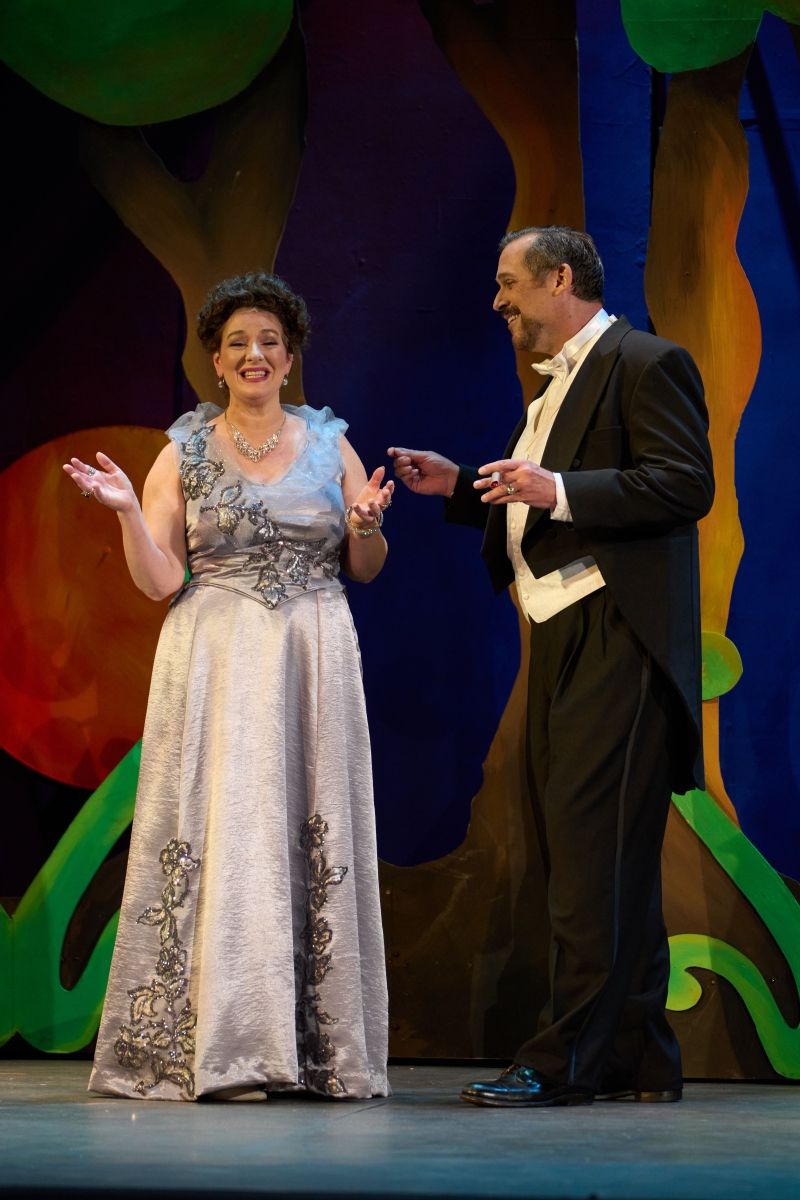Review: A LITTLE NIGHT MUSIC at Union Avenue Opera
Sondheim's most charming masterpiece opens at Union Avenue Opera.

Yesterday I mentioned to two of my kids that we'd just seen A Little Night Music. Now they had both memorized most of Sweeney Todd some forty years ago while in grade school or junior high, so I was appalled to find that neither of them was familiar with this earlier Sondheim masterpiece. What sort of wretchedly deprived childhood had we given them?!
Among Sondheim's many masterpieces A Little Night Music (1973) is by far the most irresistibly charming. The Union Avenue Opera has opened a very fine production of it.
Music and lyrics are, of course, by the incomparable Stephen Sondheim. The book is by Hugh Wheeler, whose only other collaboration with Sondheim was to be on Sweeny Todd six years later. Same team, but what a difference!
The story here is based on Ingmar Bergman's 1955 film Smiles of a Summer Night. Set in turn-of-the-century Sweden, it deals with the romantic and erotic follies of middle-age. Sondheim has magically set the entire score in waltz time, yet with such variety and beauty that one never notices the lack of other time signatures. It's perfect for the light sardonic romance we see unfold during this magical Midsummer Night.
The central characters are of middle age--sophisticated, a little cynical, yearning for lost youth--aware of their own folly, yet unable to act otherwise. Fredrik Egerman, a lawyer, is married to the beautiful Anne, who is barely eighteen (and, after nearly a year of marriage, she's still a virgin). She loves Fredrik--but in a kind of niece-like way. Frederik is patient.
Fredrik's son Henrik (by his late first wife) is a morose young seminary student. His world-view is Lutheranism at its heaviest. Henrik is burdened with a far stronger awareness of life's sins than of its joys. And his infatuation with his young step-mother is, to him, deeply shameful. (No, we'll not get into Phaedra and Hippolytus.) When Henrik's mood gets too bleak he seeks surcease of sorrow by sawing away at his melancholy cello.
The once-great actress Desiree Armfeldt arrives in town. No longer young, she's been reduced to touring the provinces. (Ironically she still calls it "The Glamorous Life".) Many years ago, between his two marriages, Fredrik and Desiree had what must have been quite a glamorous affair. But . . . she broke it off.
Other characters we meet are: the witless Count Carl-Magnus, Desiree's current lover; Charlotte, the Count's long-suffering wife; Madame Armfeldt, Desiree's mother, an aged courtesan who has been the mistress of kings and arch-dukes; Fredrika, Desiree's illegitimate young daughter; and Petra, Anne's earthy and experienced maid.
Among these variously lonely folks we have six (count them, six!) romantic triangles that appear and fade and shift and resolve. No wonder Sondheim's choice of three-quarter time. Most of the duets are sung about the third person--as when Fredrik, in a romantic moment with Desiree, can't help singing "You must meet my wife", or when Fredrik and Count Carl-Magnus sing about Desiree in "It Would Have Been Wonderful".

Baritone Peter Kendall Clark is perfectly cast as Fredrik. Handsome and with considerable dignity he clearly and unashamedly conveys the emotional helplessness of this poor man. He brings to the role a rich, strong voice and impeccable diction.
Debby Lennon's resume sports a wealth of opera, but here, as Desiree, she has a chance to flourish her Broadway skills as well. The show's one chart-topper song is "Send in the Clowns". Lennon aces it! In the circus, when some awful snafu interrupts the show, the time-tested solution is: "Send in the clowns!" Here, when the romantic complications are just intractable, Desiree invokes that old tactic. And we find that she and Fredrik are, indeed, the clowns--comic and tragic.
The very lovely Brooklyn Snow sings Anne. Ms. Snow sang that superb Cunegonde in Candide here three years ago and returned to sing the heroine roles in Les contes d'Hoffmann last year. This season she sang a lovely Nannetta in Falstaff. Now, as Anne, she again displays that vocal purity and clarity that so deeply impresses me. (Ms. Snow is just a charming little bit pregnant but I've never so willingly, eagerly suspended my disbelief as here, when she sings the virgin wife.)
Tenor James Stevens sings Henrik, the seminarian son. His voice is sweet and clear, and he is so convincing in portraying Henrik's misery and humiliation. No one pays attention to him; they just say "later, Henrik, later". The poor lad. His sexual attempt with the maid Petra is torpedoed by his yearning for Anne.
Eric J. McConnell sings the difficult comic "tin-soldier" role of Count Carl-Magnus. He captures the ludicrous melodrama of the count's raging jealousy. Lovely work!
Leann Schuering sings Charlotte, the Count's wife, It's a strong, beautiful performance, and she almost convinces us that Charlotte's love for Carl-Magnus justifies her fighting for the cad. Her rendition of the song "Every Day a Little Death" is moving indeed.
Madame Armfeldt is sung by Teresa Doggett. Ms. Doggett has long provided delicious costumes for Union Avenue Opera (as she does now for Night Music). But she is also an award-winning actress. And she's a worthy singer, as appears most especially in her nostalgic mourning for the passing of good old elegant "Liaisons".
Young Arielle Pedersen sings Fredrika, Desiree's (and Fredrik's?) daughter. She's charming and innocent and curious. And what wonderful diction!
Amy Maude Helfer sings Petra, the earthy (indeed horny) maid. Glowing with seduction, she plays with Henrik, then drifts to Frid, the butler. Late in the show she nails the cynical solo, "I Will Marry the Miller's Son".
Joel Rogier, Gina Malone, Gracce Yukiko Fisher, Philip Touchette and Sarah Price do quite beautiful work as a kind of Greek chorus, drifting through the show commenting on the night, the people, the relationships.
C. Otis Sweezy designed the lovely set. Act 1, in and around the Egerman home, is backed by simple and elegant panels. Act 2, at the Armfeldt estate, shows stylized trees and an enormous never-quite-setting sun. (It is Midsummer Night, when Swedes traditionally celebrate all night.) The sun (so say the chorus) goes down for a moment, then pops back up. I was reminded of Albee's George and Martha, who argue about the moon. "The moon may very well have gone down" says George, "but it came back up." Be it Walpurgisnacht or Midsummer Night, when those celestial orbs misbehave it means the world of humans goes magically awry.
The shifting between scenes is remarkably swift and graceful. Kudos to director Annamaria Pileggi and stage manager Sadie Harvey.
Lighting designer Patrick Huber does his usual splendid work.
Teresa Doggett gives us most attractive costumes, precisely correct for the period.
Founding artistic director Scott Schoonover leads his orchestra in perfect support of these splendid voices.
Sondheim's lyrics are precious indeed. They're brilliant and funny and sad. And they often come thick and fast. Often they're buried in very busy overlapping counterpoint, or in racing patter-songs. The acoustics at the Union Avenue Church are a little unkind, and I found myself working to keep up with the supertitles as the voices sped along. So familiarize yourself with the lyrics if possible before going. But go you must, to see A Little Night Music at the Union Avenue Opera. It plays through August 27.
(Photos by Dan Donovan)
Reader Reviews
Videos

